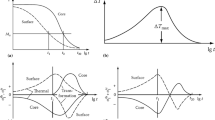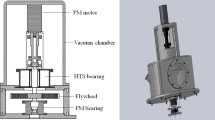Abstract
The effective insulation design of the stress grading (SG) system in form-wound stator coils is essential for preventing partial discharges and excessive heat generation under pulse-width modulation excitation. This paper proposes a method to find the optimal insulation design of the SG system aimed at reducing the dielectric and thermal stresses in the machine coil. The non-uniform transmission line model is used to predict the voltage propagation along the overhang, SG, and slot regions considering the variation in the physical properties of the insulation layers. The machine coil parameters for different insulation materials are calculated by using the finite element method. Two optimization algorithms, fmincon and particle swarm optimization (PSO), are applied and compared to find the optimal thickness and material properties of each insulation layer as well as the length and location of the SG system. The results under different rise-time excitation show that the optimized geometry by using PSO can produce a higher reduction in the dielectric and thermal stresses, as well as in the maximum overvoltage along the machine coil than the original geometry and the optimized geometry using fmincon. The machine coil model is validated by means of comparisons with experimental measurements.















Similar content being viewed by others
References
Espino-Cortes FP, Cherney EA, Jayaram S (2005) Effectiveness of stress grading coatings on form wound stator coil groundwall insulation under fast rise time pulse voltages. IEEE Trans Energy Convers 20(4):844–851. https://doi.org/10.1109/TEC.2005.853745
Oyegoke BA (2000) Comparative analysis of methods for calculating the transient voltage distribution within the stator winding of an electric machine subjected to steep-fronted surge. Electr Eng 82:173–182. https://doi.org/10.1007/s002020050008
Nouir-Masmoudi H, Dhahbi-Megriche N (2020) Stress grading material evaluation using equivalent electric network model. In: 4th international conference on advanced systems and emergent technologies (IC_ASET). pp 177–180.https://doi.org/10.1109/IC_ASET49463.2020.9318303
Emery FT, Weddleton RF (1996) Latest advances associated with the insulation systems of high voltage stator coils. In: IEEE international symposium on electrical insulation, Montreal, Quebec, Canada, vol 1. pp 226–229. https://doi.org/10.1109/ELINSL.1996.549323
Espino-Cortés FP, Olivares TIA, Gómez P (2012) Evaluation of tape-based stress grading coatings by infrared thermography. In: IEEE international power modulator and high voltage conference (IPMHVC), San Diego, CA, USA. pp 152–155. https://doi.org/10.1109/IPMHVC.2012.6518702
Umemoto T, Nakamura T, Karasawa K (2020) Computational approach to electrical and thermal behavior at end-turn stress grading system of inverter-fed rotating machine under PWM waveform. In: IEEE electrical insulation conference. pp 238–241. https://doi.org/10.1109/EIC47619.2020.9158696
Staubach C, Hildinger T (2020) Stress grading system evaluation for a converter feed hydro generator winding. In: IEEE electrical insulation conference (EIC). pp 257–260.https://doi.org/10.1109/EIC47619.2020.9158698
El-Kishky H (2002) Experience with development and evaluation of corona-suppression systems for HV rotating machines. IEEE Trans Dielectr Electr Insul 9(4):569–576. https://doi.org/10.1109/TDEI.2002.1024435
Cheng J, Taylor N, Werelius P, Abideen AK, Hao J (2020) Influence of nonlinear stress grading material on dielectric frequency response of stator insulation. In: IEEE international conference on high voltage engineering and application (ICHVE). pp 1–5.https://doi.org/10.1109/ICHVE49031.2020.9279961
Naeini A, Cherney EA, Jayaram SH (2019) A new approach to make the electric field uniform along the stress grading system of a form-wound coil under square waves. In: IEEE electrical insulation conference (EIC). pp 22–25.https://doi.org/10.1109/EIC43217.2019.9046534
Naeini A, Cherney EA, Jayaram SH (2019) Effect of conductivity on the thermal and electrical properties of the stress grading system of an inverter-fed rotating machine. IEEE Trans Dielectr Electr Insul 26(1):179–186. https://doi.org/10.1109/TDEI.2018.007618
Naeini A, Cherney EA, Jayaram SH (2019) Temperature and electric field under pulse voltage along the stress grading system of a form-wound coil. In: IEEE electrical insulation conference (EIC), Calgary, AB, Canada. pp 209–212.https://doi.org/10.1109/EIC43217.2019.9046622
Espino-Cortes FP, Gomez P, Reyes Rosario A (2007) Effect of voltage distortion on stress grading coatings working at high fundamental frequency. In: IEEE electrical insulation conference and electrical manufacturing expo, Nashville, TN. pp 159–163. https://doi.org/10.1109/EEIC.2007.4562610
Espino-Cortés FP, Asiain-Olivares TI, Gómez P (2015) Simulation of the effect of armor coating conductivity on the stress grading coating performance under PWM multilevel waveforms. In: IEEE electrical insulation conference (EIC), Seattle, WA, USA. pp 172–175. https://doi.org/10.1109/ICACACT.2014.7223542
Espino-Cortes FP, Gomez P, Betanzos Ramirez JD (2011) Modeling of heat generated on stress grading coatings of motors fed by multilevel drives. IEEE Trans Dielectr Electr Insul 18(4):1328–1333. https://doi.org/10.1109/TDEI.2011.5976135
El-Kishky H, Hebner R, Abdel-Salam M, Brown F (2006) Minimization of local field enhancement along stress-grading systems of HV large rotating machines. In: IEEE conference on electrical insulation and dielectric phenomena, Kansas City, MO, USA, pp 214–217.https://doi.org/10.1109/CEIDP.2006.312099
Hussain MK, Gomez P (2016) Modeling of machine coils under fast front excitation using a non-uniform multiconductor transmission line approach. In: IEEE North American power symposium (NAPS), Denver, CO, USA. pp 1–6. https://doi.org/10.1109/NAPS.2016.7747877.
Hussain MK, Gomez P, Espino-Cortes FP (2021) Electromagnetic transient modeling of form-wound stator coils with stress grading system under PWM excitation. Electr Power Syst Res 195:107166. https://doi.org/10.1016/j.epsr.2021.107166
Hussain MK (2012) Senserless Speed and Position of Direct Field Orientation Control Induction Motor Drive. Alkhwarizmi Eng J 8(4):9–25
Hussain MK, Gomez P (2017) Equivalent representation of machine winding in frequency domain model for fast transient studies. InL IEEE power and energy conference at Illinois (PECI), Champaign, IL. pp 1–6. https://doi.org/10.1109/PECI.2017.7935719
Hussain MK, Gomez P (2017) Modeling and experimental analysis of the transient overvoltages on machine windings fed by PWM inverters. In: 12th international conference on power systems transients (IPST’17), Seoul, Republic of Korea
Gómez P, Uribe FA (2009) The numerical Laplace transform: an accurate technique for analyzing electromagnetic transients on power system devices. Int J Electr Power Energy Syst 31(2–3):116–123. https://doi.org/10.1016/j.ijepes.2008.10.006
Cruz Dominguez D, Espino-Cortes FP, Gomez P (2013) Optimized design of electric field grading systems in 115 kV non-ceramic insulators. IEEE Trans Dielectr Electr Insul 20(1):63–70. https://doi.org/10.1109/TDEI.2013.6451342
Parsopoulos KE, Vrahatis MN (2010) Particle swarm optimization and intelligence: advances and applications, 1st edn. IGI Global, Hersey, PA
Keerthipala WWL, McLaren PG (1990) The effects of laminations on steep fronted surge propagation in large AC motor coils. IEEE Trans Energy Convers 5(1):84–90. https://doi.org/10.1109/60.50817
Villanueva-Ramirez JM, Gómez P, Meyer RT (2021) Optimized dielectric design of transformer windings under fast-front voltage pulses from power electronic converters. Int J Electr Power Energy Syst. https://doi.org/10.1016/j.ijepes.2021.106849
Funding
Non-financial interests that are directly or indirectly related to the work submitted for publication.
Author information
Authors and Affiliations
Corresponding author
Ethics declarations
Conflict of interest
On behalf of all authors, the corresponding author states that there is no conflict of interest.
Additional information
Publisher's Note
Springer Nature remains neutral with regard to jurisdictional claims in published maps and institutional affiliations.
Rights and permissions
About this article
Cite this article
Hussain, M.K., Gomez, P. Optimal insulation design of form-wound stator winding with stress grading system under fast rise-time excitation. Electr Eng 104, 3853–3865 (2022). https://doi.org/10.1007/s00202-022-01586-5
Received:
Accepted:
Published:
Issue Date:
DOI: https://doi.org/10.1007/s00202-022-01586-5




